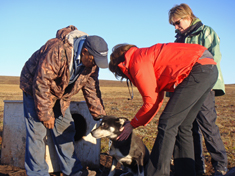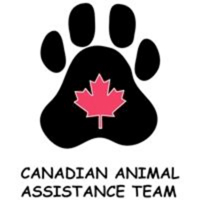Editorial: Know the Dog, the Land and the People
Fan Mail
Chinook Project Returns to Labrador
Canadian Animal Assistance Team Returns to Baker Lake
Ghosts of Dogs Past
A Conversation with
Charlotte DeWolff of Piksuk Media and
Jake Gearheard of the Ilisaqsivik Society
Qimmivut: the Ilisaqsivik Society’s Dog Team Workshop
Media Review: Of Ice and Men (book)
IMHO: Succession
Navigating This Site
Index of articles by subject
Index of back issues by volume number
Search The Fan Hitch
Articles to download and print
Ordering Ken MacRury's Thesis
Our comprehensive list of resources
Talk to The Fan Hitch
The Fan Hitch home page
ISDI home page
Editor's/Publisher's Statement
Editor: Sue Hamilton
Webmaster: Mark Hamilton
The Fan Hitch, Journal of
the Inuit Sled Dog, is published four times
a year. It is available at no cost online
at: https://thefanhitch.org.
The Fan Hitch welcomes your letters, stories, comments and suggestions. The editorial staff reserves the right to edit submissions used for publication.
Contents of The Fan Hitch are protected by international copyright laws. No photo, drawing or text may be reproduced in any form without written consent. Webmasters please note: written consent is necessary before linking this site to yours! Please forward requests to Sue Hamilton, 55 Town Line Rd., Harwinton, Connecticut 06791, USA or mail@thefanhitch.org.
This site is dedicated to the Inuit Dog as well as related Inuit culture and traditions. It is also home to The Fan Hitch, Journal of the Inuit Sled Dog.
The Fan Hitch welcomes your letters, stories, comments and suggestions. The editorial staff reserves the right to edit submissions used for publication.
Contents of The Fan Hitch are protected by international copyright laws. No photo, drawing or text may be reproduced in any form without written consent. Webmasters please note: written consent is necessary before linking this site to yours! Please forward requests to Sue Hamilton, 55 Town Line Rd., Harwinton, Connecticut 06791, USA or mail@thefanhitch.org.
This site is dedicated to the Inuit Dog as well as related Inuit culture and traditions. It is also home to The Fan Hitch, Journal of the Inuit Sled Dog.

Elaine Murphy (middle) and Kim Dunsden (right) examine a dog
prior to vaccination. photo: Elaine Murphy
Canadian Animal Assistance Team:
Maintaining a Presence in Nunavut!
by Chris Robinson,
Executive Director Canadian Animal Assistance Team
The Canadian Animal Assistance Team (CAAT) veterinary team is made up completely of volunteers that travel to a location to offer sterilization and vaccination services within the community. Nunavut has been a focus of CAAT since 2007 because there were no veterinarians in the territory to address these issues. The team also provides educational opportunities for community members in regards to animal health and the services provided. CAAT held its first animal health project in Baker Lake, Nunavut in September 2009. During that visit almost every dog owner in the community took advantage of the vaccine program to protect their teams dogs and pets against rabies and parvovirus. CAAT was told by community members of an ongoing threat of rabies from wildlife in the area. There was actually a case of a rabid wolf entering the town and attacking some local dogs the year before CAAT was asked to assist. The dogs had to be shot after being exposed because they were not vaccinated and not only were they at risk, the rabies virus posed a deadly threat to the human population as well. Parvovirus is also of concern in the community because of recurrent outbreaks of the disease there amongst puppies. Also, many dog team owners that race outside of the community were aware of the importance of vaccination. They realize that it is crucial, not only to protect their adult dogs from disease when traveling to races, but also to make sure the returning dogs are not bringing the disease back to the community's dog population after being away. Obviously, the risk of having non-vaccinated animals of any age was a very real, tangible threat in this community, as in most Nunavut communities. Often, an animal which is not vaccinated that comes into contact with a disease or virus, cannot recover from the illness and dies. This is especially true of, but not limited to, young puppies or old or sick/injured animals whose bodies cannot fight the disease. Vaccines are used to prevent diseases and to make sure that if an animal is exposed to a virus or disease that they have been vaccinated for, their system is already primed to fight it off. Vaccination is one of the simplest and most effective weapons against the most common viruses dogs (or cats) come into contact with. Vaccinations "teach" an animal’s immune system about a particular disease organism. When an animal has been vaccinated against a particular disease, an antibody is created and is then in its body, ready to fight off the invading infection. This is the reason for vaccination. It allows an animal to have antibody already present and ready to fight against a disease, instead of having to become sick and try to recover in order to have that antibody form naturally. Vaccinations stimulate protective immunity. Over time, protective immunity declines, so booster vaccinations are recommended to maintain the highest level of immune readiness.
CAAT's other service offered is to assist in reducing dog overpopulation through sterilization surgeries. Without veterinary intervention, culling unwanted dogs was the only method of population control available. Many studies have shown that sterilization has a much longer-term impact on population control than culling. An effective sterilization program can see a 30%-50% drop in population growth after the first year of a program and that benefit continues for the life of the sterilized dog.
For the second (2010) Baker Lake animal health project, there were changes that both the members of the Canadian Animal Assistance Team and the coordinator in Baker Lake saw in the response to the 2009 clinic and the services offered. In general, local community members were more knowledgeable about what the vet team does and the advantages of vaccination, spaying and neutering. Spaying the females obviously reduces the number of puppies born, eliminates the issues of attracting males while they are in heat, and reduces or removes the risk of some medical conditions in later years that are related to not being spayed, such as ovarian and mammary tumours and uterine infections. Some dog owners do not want male dogs neutered. However, other owners began to realize there are advantages to neutering. Males that are neutered tend to be much less aggressive over females and are less likely to run away in search of female dogs in heat or to be distracted from their jobs. There are also benefits reducing or removing the risk of testicular or prostate cancers as they age. Interestingly, some of the dog team owners took the opportunity to use CAAT's services as a way to selectively control breeding of team dogs, keeping only the best performers for future breeding to ensure only those dogs have litters. They also spayed older females to help keep litters at a reasonably manageable level.
September, 2011 will mark our third visit to Baker Lake. We are expecting to see a drop in the demand for spays and neuters since many dogs have been already sterilized. We will continue our educational program based on what the community feels is needed and we will continue our crucial vaccination program to make sure the dog population is protected. When we began visiting Baker Lake, our clinics were to run for three to five years to assist the community with their animal health concerns as follows:
- to reach a level within the dog population that is a manageable one from an animal welfare point of view so there is not a population of unwanted dogs that are not cared for and would require culling,
- to create a vaccination program that will help the dog population to fight off disease (one of which is extremely dangerous to humans) and maintain a healthy status,
- to provide education and guidance to interested dog owners in the community with regards to animal health needs, and to assist them in creating a healthier, more manageable dog population,
- to provide education for children on dog bite prevention.
We look forward to returning to Baker Lake in the fall of 2011!
The Canadian Animal Assistance Team is a registered Canadian charity organization that relies on public donations to fund the medical supplies and some travel expenses for their projects. If you would like to make a donation to assist CAAT in their work, please visit our website or mail a cheque to Canadian Animal Assistance Team, 4411 King St. E., Kitchener, ON N2P 2G1, Canada.
